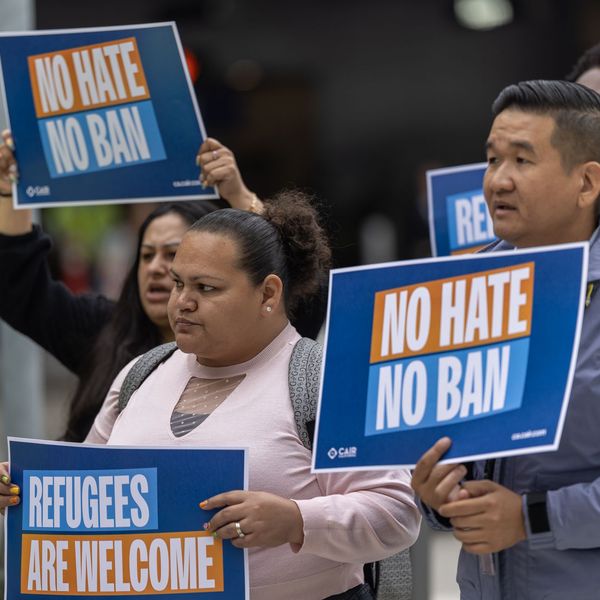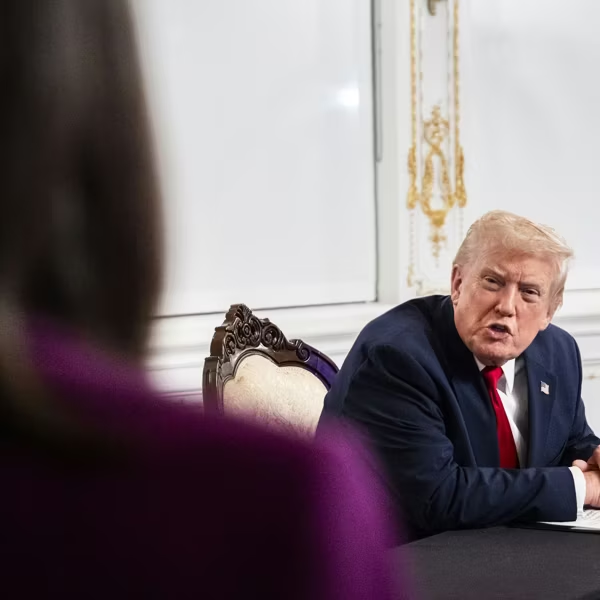More States Sue to Block Trump's "Muslim Ban By Another Name"
"It's my expectation that we will continue to prevail, and certainly my expectation that the president will continue to respect the decision of the court"
At least three more states are suing President Donald Trump over his new travel ban, as Washington state--whose legal action suspended the original executive order--said Thursday that it would renew its request to block the revised one.
Washington's Attorney General Bob Ferguson said both Oregon and New York are joining his state's legal challenge to the new order, which blocks travelers from six majority-Muslim countries from entering the U.S. for 90 days, and blocks refugees for 120.
New York Attorney General Eric Schneiderman also said that Minnesota would be taking part in the lawsuit.
Ferguson said the court will decide whether the new ban, which affects travelers from Iran, Libya, Somalia, Sudan, Syria, and Yemen, exempting current visa holders, is similar enough to the original memo to be covered under the same restraining order that suspended the first one days after it was signed. That memo also banned Iraqi travelers from entering the U.S. for 90 days and blocked Syrian refugees indefinitely.
"It cannot be a game of whack-a-mole for the court," Ferguson said. "That TRO [temporary restraining order] we've already obtained remains in effect."
Critics say the new order boils down to a scaled-back version of the original "Muslim ban" that prompted widespread protests and legal actions in January.
The new round of lawsuits follows in Hawaii's footsteps, which became the first state to challenge the new order on Tuesday. Both Ferguson and Hawaii Attorney General Doug Chin argue that the ban is unconstitutional and would hurt their states' respective economies and educational institutions.
"We've won in court, and the president has had to honor those defeats," Ferguson said. "It's my expectation that we will continue to prevail, and certainly my expectation that the president will continue to respect the decision of the court."
Schneiderman separately said Thursday, "President Trump's latest executive order is a Muslim ban by another name, imposing policies and protocols that once again violate the Equal Protection Clause and Establishment Clause of the United States Constitution."
An Urgent Message From Our Co-Founder
Dear Common Dreams reader, The U.S. is on a fast track to authoritarianism like nothing I've ever seen. Meanwhile, corporate news outlets are utterly capitulating to Trump, twisting their coverage to avoid drawing his ire while lining up to stuff cash in his pockets. That's why I believe that Common Dreams is doing the best and most consequential reporting that we've ever done. Our small but mighty team is a progressive reporting powerhouse, covering the news every day that the corporate media never will. Our mission has always been simple: To inform. To inspire. And to ignite change for the common good. Now here's the key piece that I want all our readers to understand: None of this would be possible without your financial support. That's not just some fundraising cliche. It's the absolute and literal truth. We don't accept corporate advertising and never will. We don't have a paywall because we don't think people should be blocked from critical news based on their ability to pay. Everything we do is funded by the donations of readers like you. Will you donate now to help power the nonprofit, independent reporting of Common Dreams? Thank you for being a vital member of our community. Together, we can keep independent journalism alive when it’s needed most. - Craig Brown, Co-founder |
At least three more states are suing President Donald Trump over his new travel ban, as Washington state--whose legal action suspended the original executive order--said Thursday that it would renew its request to block the revised one.
Washington's Attorney General Bob Ferguson said both Oregon and New York are joining his state's legal challenge to the new order, which blocks travelers from six majority-Muslim countries from entering the U.S. for 90 days, and blocks refugees for 120.
New York Attorney General Eric Schneiderman also said that Minnesota would be taking part in the lawsuit.
Ferguson said the court will decide whether the new ban, which affects travelers from Iran, Libya, Somalia, Sudan, Syria, and Yemen, exempting current visa holders, is similar enough to the original memo to be covered under the same restraining order that suspended the first one days after it was signed. That memo also banned Iraqi travelers from entering the U.S. for 90 days and blocked Syrian refugees indefinitely.
"It cannot be a game of whack-a-mole for the court," Ferguson said. "That TRO [temporary restraining order] we've already obtained remains in effect."
Critics say the new order boils down to a scaled-back version of the original "Muslim ban" that prompted widespread protests and legal actions in January.
The new round of lawsuits follows in Hawaii's footsteps, which became the first state to challenge the new order on Tuesday. Both Ferguson and Hawaii Attorney General Doug Chin argue that the ban is unconstitutional and would hurt their states' respective economies and educational institutions.
"We've won in court, and the president has had to honor those defeats," Ferguson said. "It's my expectation that we will continue to prevail, and certainly my expectation that the president will continue to respect the decision of the court."
Schneiderman separately said Thursday, "President Trump's latest executive order is a Muslim ban by another name, imposing policies and protocols that once again violate the Equal Protection Clause and Establishment Clause of the United States Constitution."
At least three more states are suing President Donald Trump over his new travel ban, as Washington state--whose legal action suspended the original executive order--said Thursday that it would renew its request to block the revised one.
Washington's Attorney General Bob Ferguson said both Oregon and New York are joining his state's legal challenge to the new order, which blocks travelers from six majority-Muslim countries from entering the U.S. for 90 days, and blocks refugees for 120.
New York Attorney General Eric Schneiderman also said that Minnesota would be taking part in the lawsuit.
Ferguson said the court will decide whether the new ban, which affects travelers from Iran, Libya, Somalia, Sudan, Syria, and Yemen, exempting current visa holders, is similar enough to the original memo to be covered under the same restraining order that suspended the first one days after it was signed. That memo also banned Iraqi travelers from entering the U.S. for 90 days and blocked Syrian refugees indefinitely.
"It cannot be a game of whack-a-mole for the court," Ferguson said. "That TRO [temporary restraining order] we've already obtained remains in effect."
Critics say the new order boils down to a scaled-back version of the original "Muslim ban" that prompted widespread protests and legal actions in January.
The new round of lawsuits follows in Hawaii's footsteps, which became the first state to challenge the new order on Tuesday. Both Ferguson and Hawaii Attorney General Doug Chin argue that the ban is unconstitutional and would hurt their states' respective economies and educational institutions.
"We've won in court, and the president has had to honor those defeats," Ferguson said. "It's my expectation that we will continue to prevail, and certainly my expectation that the president will continue to respect the decision of the court."
Schneiderman separately said Thursday, "President Trump's latest executive order is a Muslim ban by another name, imposing policies and protocols that once again violate the Equal Protection Clause and Establishment Clause of the United States Constitution."

